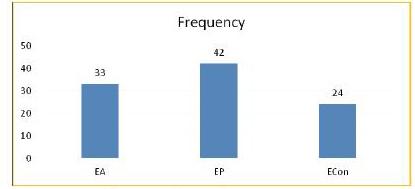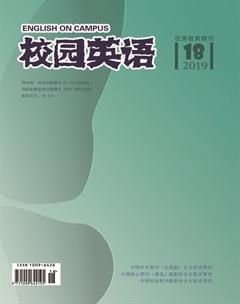On the Misuse of Function Words in College Students’Peer

【Abstract】English as a global language has become an important tool for Chinese people to learn the world. Meanwhile, the existence of China English also contributes for the development of the English language. By adopting an error analysis method, this paper attempts to find out the common features of the use of function words in Chinese college students peer-peer interaction. This study will help to demonstrate the objective existence of China English, and can be conductive in improving the Chinese college students English teaching.
【Key words】function words; peer-peer interaction; China English
【作者簡介】张海波(1986-),男,江苏连云港人,淮阴工学院外国语学院,讲师,博士,研究方向:应用语言学研究。
【基金项目】江苏省高校哲学社会科学基金项目(2015SJB699)。
1. Introduction
Today, more than a quarter of Chinese people have joined into the trend of English learning. However, the sentences Chinese English learners use are often different from the standard English. The use of function words often cause problems in their communications. This paper adopts an error analysis method to find out the common features of the use of function words in Chinese college students peer-peer interaction. It could help to improve the current situation of Chinese college students English learning and provide Chinese English teaching with a practical reference. Also this study will help to deepen the research on China English.
2. Methodology
40 students from H university participated in this study. All of whom are sophomore students who have been learning English for about eight years. All participants were divided into 20 groups and each with two students. Each group needs to have a free talk on the given topics for at least 5 minutes. The topics are related to their daily life such as travel, cities & tourist attractions, packing a weekend bag, etc. All conversations were recorded, transcribed and analyzed.
Error analysis was adopted in this paper. The misused function words were mainly classified into three parts, which are errors on the use of articles, errors on the use of prepositions and errors on the use of conjunctions. All of them have been marked with 3. Results
The most frequently used three types of errors in Chinese college students peer-peer interaction data are as follows:
Figure 1: Frequency of the misuse of function words
3.1 Errors on the Use of Articles
3.1.1 Misusing articles before common nouns
E.g.① C46: The last one. I want to visit Italy, and it have many delicious food.
C60: Yes. We have a lot of the
E.g.②C51: I like traveling too. Because when I dont have a good mood, I can go traveling to relax myself. I can also stay with my best friends and the
For the common words which havent been mentioned above or havent been known by both conversation participants, it is unnecessary to put a definite article before them. However, a large quantity of evidences show us that Chinese college students are used to emphasizing these nouns by using “the”.
3.1.2 Omission of articles before the proper nouns
E.g.① C46: Can you describe the worst trip you ever took? Where did you go and what made it a bad trip?
C60: I go... Er... When I and my aunt go to
E.g.② C05: Hi! Tomorrow we will go to
C29: Oh, yes.
Some proper nouns which are composed of common nouns, such as “Hong Shan Park” and “Huaguo Mountain”, should be qualified by definite article. They should be corrected as “the Hong Shan Park” and “the Huaguo Mountain”.
3.2 Errors on the Use of Prepositions
3.2.1 Misuse of Preposition collocations
E.g. C51: What tourist attractions in China or overseas would you like to see? Why?
C52: and... and stayed in
Like all languages, standard English has its own language conventions. And regular collocations constitute an important part of it. The prepositions in regular collocations are irreplaceable, such as “on the top of”, “look down toward sb. / sth.”.
3.2.2 Misuse of prepositions after transitive verbs and intransitive verbs
E.g.① C59: You said those countries have little pollution is so good. I want to visit these countries you said too.
C44: We can go to
E.g.② C68: ...Thats so exciting. And I want to learn to
Verbs can be classified into transitive verbs and intransitive verbs. The difference between them is whether they need a preposition after them when they have objects. “Go” is actually an intransitive verb. So when “go” have no object follow it, the preposition “to” will be needless. In a similar way, “learn” as a transitive verb, the “to” between its object and it should be deleted as well.
3.3 Errors on the Use of Conjunctions
3.3.1 The overuse of “and”
E.g.① C51: What tourist attractions in China or overseas would you like to see? Why?
C52: ...Because, there are many delicious food and we can experience all kinds of food. And
E.g.② C38: which cities would you like to travel the most?
C68: ...Thats a very beautiful place. And I like the sea very much. So, I want to go to the Gulangyu in Xiamen. And
“And” as a conjunction has its own position in a sentence that it not always needs an “and” between all paratactic items. When a sentence has two paratactic items, “and” should be put between them. When a sentence has three or more paratactic items, it only needs to put an “and” before the last item. It is obviously that the “and” before these sentences are needless. Both “secondly” and “last but not least” are opening words and have similar function in connecting the context.
3.3.2 Illogical conjunctions
E.g.① C13: For example, its convenient for us to live...to live. But it also leading many disadvantages. But
The use of conjunctions should be logical. In this paragraph, it has no transition relation between the second and the third sentence, so the “but” is exactly unnecessary.
E.g.② C20: Do you think online shopping is convenient and why?
C23: Although it is convenient, but
In Chinese, logical conjunctions are always in couples, while in English, they need only one conjunction to express the logical relationship between sentences. Take this sentence as example, it can be corrected as “Although it is convenient, I dislike to go online shopping.”, or “It is convenient, but I dislike to go online shopping.”
4. Implications and conclusion
By adopting error analysis method, this paper has analyzed the errors on the use of articles, prepositions and conjunctions which are the main composing parts of function words. English as a global language is used to help us communicate with foreign people. So it is far from enough for Chinese college students to make their English only understood by Chinese people. Why is it so difficult for Chinese college students to use English just like native English speakers? One of the most important reasons shall be the difference between Chinese and English thought patterns. Chinese college students can understand each other because they share the same Chinese thought pattern, while for foreign people with English thought pattern, it could be quite hard to understand them.
Chinese college teachers should take actions to help students transform their thought pattern. For example, teachers can ask students to read more original English classics or recommend some British or American series. Reading and listening to Standard English written or spoken by native English speakers will help Chinese college students gradually transform their mind into English thought pattern. Speaking like native English speakers is difficult, but not impossible.
References:
[1]Guan Meng. China English, Chinglish and English learning[J]. US-China Foreign Language,2007(44):6-11.
[2]Hu Xiaoqiong. China English, at home and in the world[J]. English Today,2005(3):27-38.
[3]Kachru, Braj B. Asian Englishes:Beyond the Canon[M]. HongKong: HongKong University Press,2005.
[4]Lin Meng, Jiang Yi & Jiang Xin. China English——a World-be Prosperous English Language Variety[J]. Journal of Language & Literature Studies,2008(6):80-82.
[5]Xiao Qian. A Literature Review of Research on Error Analysis Abroad[J]. Overseas English,2014(8):268-270.
[6]Zhu Hui. The Positive Effect of China English[J]. Overseas English,2013(14):26-28.

